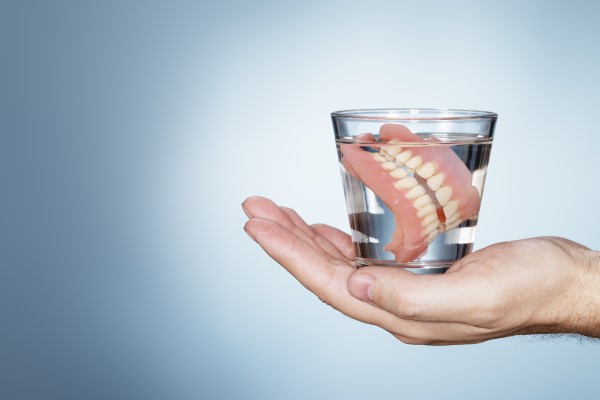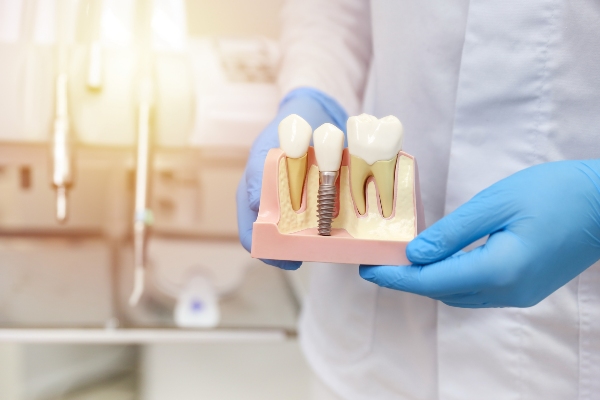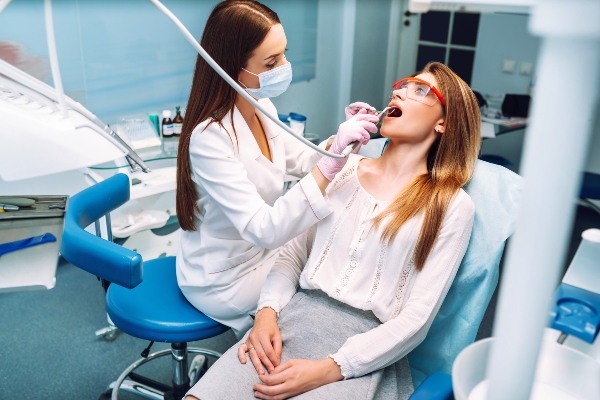3 Tips for Adjusting to New Dentures

If you are the proud owner of new dentures, you may wonder what the adjustment period will be like. Although dentures replace missing teeth and give you an improved smile, they do take a little while to get used to. For many people, it can take up to a month to feel comfortable wearing them and feeling confident out in public. The key is to set realistic expectations and be patient during the adjustment phase.
Tips for adjusting
It is normal to have some gum irritation as you get used to wearing your new dentures. When your dentures are first placed, the dentist will make any adjustments that will assist in the right fit. However, as the dentures adjust to your mouth, you may need to go back in for additional adjustments if you continue to have mouth sores.
1. Experiment with adhesives
One of the common issues new wearers have with dentures is that they have difficulty staying in place. Using adhesives is one way to adjust and prevent major slippage. Adhesives come in gels and strips, and there are various ones available. Your dentist may be able to give you a recommendation, or you may want to be prepared to try a few different ones before you find the right adhesive for your needs.
The need for adhesives probably will not last forever. As the muscles in your mouth and cheeks get used to the dentures, you will more than likely discover that you can use less or none at all, and your dentures will still stay in place.
2. Learn to eat with them
Eating is another issue at the beginning. For the first few days or so, stick to soft foods. Examples include smoothies, mashed potatoes, jello, pudding, oatmeal, pureed fruits, eggs, and soup. As you get more used to eating with your dentures, you can begin to add in more solid foods such as rice, cooked veggies, pasta, and fish.
It helps to cut up food into small pieces and chew evenly on both sides. Even when you are ready to eat normally, there are some foods to avoid, as they can damage the dentures. Stay away from sticky, hard, and chewy foods.
3. Practice speaking
When you wear dentures, you will probably discover that it is more difficult to pronounce certain sounds than others. During the adjustment time, practice speaking out loud at home and in front of a mirror. Some people also find that singing smooth phrases at a slower pace helps with speech training. If your dentures seem to slip as you begin to speak, it may help to bite down and swallow before speaking, as this returns the dentures to their proper position.
FAQs
In addition to adjusting to new dentures, there are several other things to consider. This miniature FAQ section may help you to make better decisions about your denture process.
What can I eat the day I get new dentures?
Because your gums will still be very sensitive as you get used to your new dentures, you will need to eat only soft foods on the first day that you wear them. Typically, items such as ice cream, pudding, and mashed potatoes are preferable.
Can I take out my dentures for a while if they hurt?
While you can take out your dentures whenever you choose (and are encouraged to do so at night), it is important to keep in mind that the longer and more often you wear them, the easier it will be for your body to adjust to them.
How long will it be before I can resume eating and normal activity?
Most people return to their regular food items and activity levels by the end of a 30-day period. After a month, you should be able to eat all of your favorite foods again and participate in all of your favorite activities.
Do dentures last forever?
Unfortunately, dentures do not last forever. Depending on the level of use, you will need to have your dentures replaced every 5-10 years. The better you take care of them, the longer they will last.
Conclusion
Eventually, you will appreciate your dentures for their ability to help you speak and eat normally. However, there is an adjustment period in which you and your gums need to get used to them. Following these tips should make the process easier.
Request an appointment here: https://www.roderickgarciadmd.com or call Roderick A. Garcia, DMD PC at (505) 634-5029 for an appointment in our Albuquerque office.
Check out what others are saying about our dental services on Yelp: Dentures and Partial Dentures in Albuquerque, NM.
Recent Posts
Partial dentures with dental implants offer a long-term solution to replacing a section of missing teeth. This is a great replacement solution even if you have multiple teeth that are missing, as it utilizes two or more dental implants to support the partial denture rather than having the dentures rest upon and be supported by…
Replacing missing teeth with dentures restores much of their functionality. However, dental appliances are limited in what they can do compared to natural teeth. While you should be able to return to eating many of the foods that you enjoyed before you lost your teeth, some could cause problems for you. You should avoid eating…
Are you considering getting partial dentures to replace your missing teeth? This can be a good solution to tooth loss. This may not make the most sense in every situation, but your dentist can help you decide if the treatment is right. There are benefits to choosing these dentures to restore your smile. There are…
If you want to improve the look of your smile with minimal effort and time, a professional teeth whitening treatment is a great option. These procedures can help remove years of staining for teeth that look whiter, beautiful, and younger after just one session. Post-treatment sensitivity can happen to some, but there are many ways…


